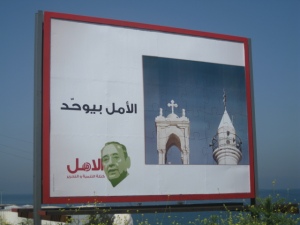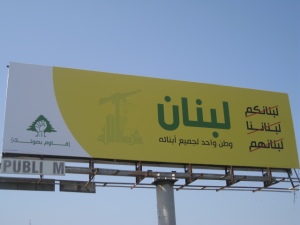Watching the heated start of the legislative elections 2009 campaigning-marketing initiatives I could not refrain myself to remarkzz a couple of points, although quite disarticulated here is a draft for those who are crazy enough to read:
1- Election campaigns have totally new techniques (as I said earlier much better imbued with advertising brand-empowering), away from the cult of the figure, and into the elusive world of concepts. The striking transitive example is Amal that has its own brand empowering (Al Amal Youwahid, Hope unites) along with a logofied picture of Nabih Berri. this kicking in of advertising techniques are really something compared to previous elections in that flooded the country with people’s faces. Portraits should start appearing now, although I am not in Beirut to testify.

2- Battles occur at the symbolic level where one idea of the nation prevail in reaction to what the other propose. At this level, and without taking actual intentions into consideration (meaning that I don’t care if these guys do ‘mean’ what they say), Hizbullah and Amal’s campaign are unifying symbolically, whereas LF and and Kataeb are reactive border-lining resentfulness. Tayyar campaign is a bit pompous I must say, looking overly confident and it kind of goes well with the projected character of its leader General Aoun (see here for an example). I say projected because it is how he is perceived that counts and because it mirror well with its Christian constituency social practices (Lebanon is the Switzerland of the ME, fashion, pubs etc.)
So in a sense, campaigns are reactionary, and even more so, they stigmatize quite well who is ‘more at ease’ in the perception of his political presence on the Lebanese scene. It also represents quite well the different historical perception of the different confessions of the Lebanese state. Anyway, when Kataeb Insurance-product-like ads (al Barlaman silahouna, the Parliament is our weapon) make a clear allusion to Hizbullah’s weapon, Hizbullah has a rebuttal to Kataeb newcomers (Sami Gemayel and his Loubnanouna, on which I vented), with their “Loubnanoukom, loubnanouna, loubnanouhom” (Your Lebanon, Our Lebanon, Their Lebanon) barred and “loubnan watan wahid li jami’ abna’ihi” (Lebanon, one nation for all its people). The strong is all-embracing, not out of some murky sentimental love mind you but just out of his position of power, while the weak is isolationist and resentful. I did not invent that, the last guy to elegantly conceptualize this timeless fact is Nietzsche with his morality of master and slave.

3-So the fight is clearly conceptual. But that’s what advertising is all about. And the Lebanese advertising ‘community’ has been working on its slogans for decades now. These are the real nationalists. And its inclusion in the political ethical discourse is rather new in the Lebanese setting. But this goes hand in hand with the idea that TV, newspapers, ads, etc. are the new temples of this ‘religion’ called the Nation. And here friends and relatives, I just look from one angle of what the term religion could actually mean. These media devices are producers of morals, in the Nietzschean sense, they are the protectors of the liberal tradition: the idea that man as an individual is free and a utility-maximizer. This tradition can only exist when is erected through the new moral boundaries in which this freedom is incarcerated: “You’re free but you have to behave this way, consume this or that, be Lebanese, or Palestinian or French, etc.” My point is surely not that man could be free and is enchained once again. My point rather is that the liberal tradition has made people think they could be free in a rather novel way (from previous traditions), to conceptualize freedom as such and really believing that it is a worthy, if not the number one goal to achieve, in order to crystallize even more so the imprisonment of man in the capitalist-eco-technological-commodifying system whatever you want to call it of today.
4- I will glimpse on my last point and think about it for another post. Hizbullah’s biggest competitor on the Lebanese scene is tayyar because it is the only party that people defined confessionally as shi’a takes somewhat seriously. Here competitor can involve a constructive process. It is the challenge of the presence of Tayyar and its popularity throughout its Shi’a constituency, that will push Hizbullah to move more and more away from a politico-religious discourse, here religion means a specific reading of a socio-historical tradition to a more national-political one. It does not mean that Hizbullah will do away with Islamic idioms, far from it, but this political ‘islamicity’ will develop quite differently (and has already been evolving in different directions for quite some time). I must say that whether you want to call the State “secular”, or “religious” or what have you, the important point that will never change is that the State is here to stay with its projected imaginary sense of a nation. Political slogans such as the liberation of Jerusalem, may well invite for new types of political solidarity pushes, but at best it will facilitate a drive to better regional integration (EU style) more than anything else. Breaking from the boundaries of the nation-state even for movements that emerged at the antipodes of it is going to be quite difficult. it does not mean that all local movements are ‘nationalists’ whatever that may mean. It just means that these group want to play the nationalist card because that’s what works and counts politically.
 The date of this event is not relevant anymore as it is just a template for similar recurring events in the land of the Lebanon. Crumbling under the weight of her make up the talkshow host of “للنشر” (for publication) bullied for about 20min a Syrian woman nursing a baby. The woman turned out to be a beggar who we are told fakes being handicapped in order to get money on the streets of Beirut. The contrast between these two women was striking. The beggar was dressed in rags holding her child whose skin was blackened by Beirut dusty and filthy streets while the TV host shined with her jewelry, her fancy clothes. The contrast went hand in hand with the domineering and judgmental attitude the TV hostess has as the discussion quickly turned into a general critique of the beggar’s way of life. At some point her child started crying and she said that she needed to breast feed him to which the hostess rushed to kick her out of the stage. This episode of the show was immediately followed by a series of ads about glittering jewelry!
The date of this event is not relevant anymore as it is just a template for similar recurring events in the land of the Lebanon. Crumbling under the weight of her make up the talkshow host of “للنشر” (for publication) bullied for about 20min a Syrian woman nursing a baby. The woman turned out to be a beggar who we are told fakes being handicapped in order to get money on the streets of Beirut. The contrast between these two women was striking. The beggar was dressed in rags holding her child whose skin was blackened by Beirut dusty and filthy streets while the TV host shined with her jewelry, her fancy clothes. The contrast went hand in hand with the domineering and judgmental attitude the TV hostess has as the discussion quickly turned into a general critique of the beggar’s way of life. At some point her child started crying and she said that she needed to breast feed him to which the hostess rushed to kick her out of the stage. This episode of the show was immediately followed by a series of ads about glittering jewelry!



